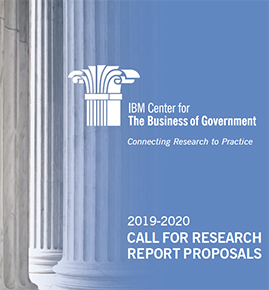
New Research Report Recipients

We are pleased to announce our latest round of stipends for new reports on key public sector challenges, which respond to priorities identified in the Center's research agenda. Our content is intended to stimulate and accelerate the production of practical research that benefits public sector leaders and managers. We expect the following reports to be published in late 2020.
Digital Transformation through Cognitive Computing Systems: Business Model Innovations and Maturity Framework by Kevin Desouza, Queensland University of Technology
Governments are experimenting with, and implementing, cognitive computing systems, which include artificial intelligence, machine learning, and similar technologies. This report will document various digital transformation journeys that public agencies have embarked on as they modernize the business of government, leveraging the potential of cognitive systems. A maturity model will be put forth to enable public agencies to evaluate, benchmark, and advance their cognitive computing efforts, along with case studies that illustrate effective practices at each stage of maturity. The author will frame the report around major components of a “cognitive enterprise.”
Other Transactions: Approaches, Applications, and Challenges by Jason Knudson and Stan Soloway, University of Colorado
Other Transaction Authority (OTA) is a congressional authority that allows certain federal agencies to enter into transactions with commercial entities using non-traditional procurement methods and contract terms. While OTAs have been around in NASA since 1958 and within the Department of Defense since 1989, they have experienced significant growth in recent years following the inclusion in the 2016 National Defense Authorization Act (NDAA) of expanded authorities. This report will address the following issues: To what extent do agencies use different strategies to award OTAs? How effective are OTAs in achieving their stated goals of attracting new and innovative solutions and providers to government? To what extent do they align, or not, with the tenets of public procurement? How prepared are government activities to utilize OTAs effectively? And how does the changing technology landscape impact the need or value of OTAs? The report will conclude with recommendations on how to improve OTAs and other non-traditional contracting.
Managing Natural Disasters for Sustainable Local Government Financing and Economic Development by Katherine Willoughby, University of Georgia, Sarah Beth Gehl, The Roosevelt Institute, and Komla Dzigbede, SUNY Binghamton
As the incidence and severity of natural disasters has increased, the U.S. Federal Emergency Management Agency has raised expectations of first and primary responders following a disaster. This requires reorientation among all partners regarding the role and readiness efforts necessary to manage effectively through disaster. Given these requirements, this report will explore the state of sub-national government readiness - specifically, how local governments are prepared for disasters, and how they coordinate with the national government. This report will explore how governments apply enterprise approaches for disaster preparedness, emergency management, and post-disaster recovery to mitigate risks, achieve efficient and effective governance outcomes, and promote sustainable economic development.
The Power of Data to Break Down Silos: Successful Intergovernmental Data Exchange by Jane Wiseman, Harvard Kennedy School Ash Center
With attention from the Federal Data Strategy, data analytics capacity in government is advancing rapidly, yet most successes to date are single agency projects in data analysis, visualization or insight. Few case studies exist on how data sharing across departments, across levels of government or with the private sector can achieve public benefit by adding increasing value with each data set shared and compared. This report will document success in intergovernmental data sharing, including known mobility data exchange and regional data sharing along with additional cases to be identified through the research. Lessons learned that apply broadly will be shared.
How Can Government Be Agile? By G. Edward DeSeve, Fellow with the National Academy of Public Administration and Visiting Fellow, the IBM Center for The Business of Government
Agile software development features small, cross-functional, self-organizing teams that include customers working quickly to deliver solutions in increments that immediately provide value. Agile delivery approaches support government goals of doing more with less and improving agency capacity to manage their budgets and delivery dates. This report will focus on infusing agile thinking throughout government agencies, drawing on lessons from agile software development and expanding the scope of these lessons across other key government functions and mission areas. Principles, best practices, and case studies will be provided.
Open Data, Open Source, and Open Cloud Strategies for the Federal Government by Joel Gurin, Center for Open Data Enterprise
This report will assess how open data, open source, and open cloud strategies can be aligned to best unlock their full potential for the federal enterprise and public good. The report will provide information on policies and practices for open strategies, with recommendations and a road map to help federal agencies apply open strategies.



